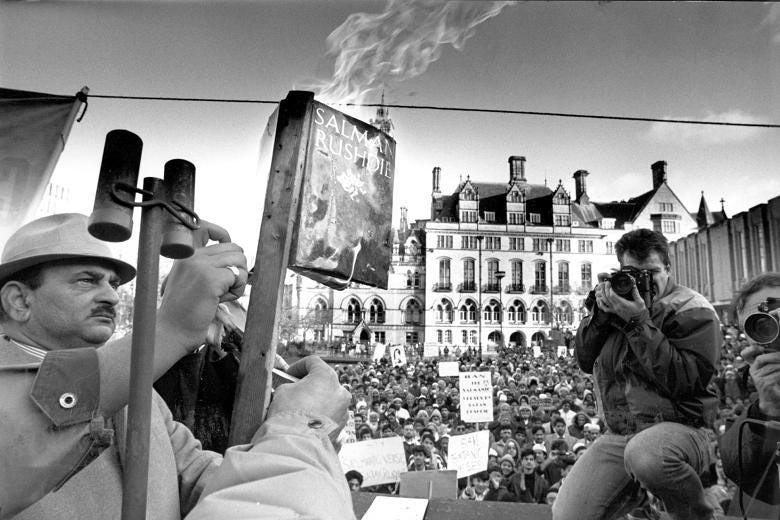Cultural Embodiment @ The Stoa Is at Noon EST Tomorrow ~ Words Are Violence or Violence Is Violence?
Witnessing the recent attempted murder of the writer, Salman Rushdie

On Friday night while giving a talk at the Chautauqua Institute in New York, the writer, Salman Rushdie, was brutally attacked and stabbed ten times. Over the weekend his condition was unknown. The news now is that he sustained life-altering injuries including the loss of an eye, but he has survived.
Tomorrow (Thursday) during Cultural Embodiment @ The Stoa, we will try to be present to the full import of the attack, which in a sense is the culmination of a 33-year literary saga.
It began with the publication of The Satanic Verses in 1988 and the subsequent issuance of a fatwa, or edict, by Iran's religious leader Ayatollah Khomeini. The fatwa called for the execution of Rushdie and claimed that the book, which includes a fictional depiction of the prophet, Mohammed, was “insulting” to Islam. The fatwa forced Rushdie into hiding for decades. Numerous violent acts happened as a result including the deaths of some translators and publishers associated with the making and distribution of the book around the world.
When it happened and in the intervening years, many high-profile literary figures and politicians defended Rushdie, citing freedom of speech. A few criticized Rushdie for being a trouble-maker; presumptuous and arrogant to demean fiercely-held religious values and figures.
In recent years, the author had resumed much of his public life. In July 2020, he entered the debate about free speech again to sign an open letter (along with 152 other prominent authors and literary figures) railing against “cancel culture” and the increasingly constricting conditions for public intellectuals and artists. Here is an excerpt:
The free exchange of information and ideas, the lifeblood of a liberal society, is daily becoming more constricted. While we have come to expect this on the radical right, censoriousness is also spreading more widely in our culture: an intolerance of opposing views, a vogue for public shaming and ostracism, and the tendency to dissolve complex policy issues in a blinding moral certainty. We uphold the value of robust and even caustic counter-speech from all quarters. But it is now all too common to hear calls for swift and severe retribution in response to perceived transgressions of speech and thought. More troubling still, institutional leaders, in a spirit of panicked damage control, are delivering hasty and disproportionate punishments instead of considered reforms. Editors are fired for running controversial pieces; books are withdrawn for alleged inauthenticity; journalists are barred from writing on certain topics; professors are investigated for quoting works of literature in class; a researcher is fired for circulating a peer-reviewed academic study; and the heads of organizations are ousted for what are sometimes just clumsy mistakes. Whatever the arguments around each particular incident, the result has been to steadily narrow the boundaries of what can be said without the threat of reprisal. We are already paying the price in greater risk aversion among writers, artists, and journalists who fear for their livelihoods if they depart from the consensus, or even lack sufficient zeal in agreement.
Friday’s attack was premeditated and perpetrated by a young man who wasn’t even born when the book was originally published. Some details about the life and motivations of 24-year old, Hadi Matar, are coming out now including the usual comments from neighbors and coworkers that he seemed reclusive, isolated, and miserable. But also that he didn’t seem violent. One emergent storyline is that he was radicalized on a 2018 trip to the Middle East.
From an embodiment standpoint, this is a tough story to take in. It includes a public attack, violence with intent to kill. It requires us to face our fears and prejudices. And it requires us to feel the harsh realities of free speech. A lot of the media attention is focused on the words, the ideas, and the details of the story. It’s a larger-than-life saga, epic like the works of fiction Rushdie is famous for. We can get caught up in the debate about what is right and who is wrong. We can also make meaning of it all for ourselves by feeling the effects of the story in our bodies. As usual, it’s a complex issue. Come and help us feel the different facets of the gem of wisdom hidden here.
Tomorrow, Thursday, at noon EST.










